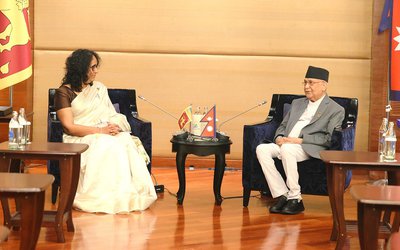Nepal is at a heightened risk of renewed conflict. Internal feuds, nepotism and power struggle within and between political parties eroded credibility of the political parties in the post-1990, the post-constituent assembly elections and the post-constitution.
The role of the political parities and leaders are largely short sighted, accusing and not fully convincing. The majoritarian rule has triggered political polarization and the political parties in the legislative parliament are unable to make the best use of their opportunities to advance implementation of the constitution as well as local development.
There is no constructive opposition in the parliament. It’s a matter of time; political party is waiting to join the government in coalition. Throughout 2016 and now in the early 2017, there is legacy of tension between defending and challenging power and privileges.
People are getting increasingly frustrated with the behavior of the political parties and functioning of governance. This can result in the breakdown of the trust and confidence within and between the citizens and the state – pushing the country to a failing trajectory.
So, the legacy of political confrontation must be broken in 2017 and we should move ahead without further wasting time and resources. I would like to offer some suggestions:
• Constitutional amendment through voting: The Constitution amendment registered at the parliament should be put to a vote to decide whether it will be endorsed or not. The political parties must take ahead parliamentary process of constitution amendment if the efforts to forge the consensus failed, without further delays. The Supreme Court has now given the verdict that the right to make a decision in accordance to the Constitution after examining and determining the Constitution amendment bill’s appropriateness is in the Legislature-Parliament. It’s injustice to the people if the political parties continue to stall the Parliament.
• Get ready for elections: The Constitution can be implemented only if local, provincial and federal elections are held in time. These elections are also essential to end the transition. The government could consider holding all three elections simultaneously, under the new structure, to save country’s resources.
• Fighting against impunity: The political parties must put to an end the practice of withdrawing criminal cases against individuals with political affiliation. The culture to provide political protection to the frauds and criminals must end once and for all. The political parties must fight collectively against impunity relating to human rights violations and promoting rule of law.
• Promote religious tolerance and harmony: Nepal has a history of religious tolerance and harmony. It is exemplary in the world. No matter what, Nepal will always remain as a country of diversity. However, we are becoming more intolerant and the political use of religion is an upcoming dangerous syndrome. The government should promote religious tolerance, in addition to legal mechanisms, through education, access to information to allow the public to differentiate between facts and opinions, public awareness and non-violent community actions.
• Finalize 14th Plan as a national agenda: The political parties should devote time to finalize 14th Plan as a coherent national plan in line with Sustainable Development Goals (SDGs) and federal structure. There should be better clarity about comparative roles, responsibilities and financing among the local, provincial and federal government. Local government should have more authority and resources for local development, and local people should be able to hold the local government accountable for action or inaction.
May these suggestions be the resolution of the political parties in 2017. We hope 2017 will be better than 2016 in terms of political governance and nation building.
Author: Dr. Prabin Manandhar is an expert of international development. Currently, he is working as Country Director of The Lutheran World Federation. He is the Chair of the Association of International NGOs in Nepal (AIN). He is also a visiting faculty at the Kathmandu University. He can be reached at prabin.manandhar11@gmail.com
- World Humanitarian Day 2024: Committing to Peace and Accountability
- Aug 19, 2024
- Nepal Investment Summit: Unlocking Economic Potentials For Growth And Development
- Apr 28, 2024
- Investing In Women: Accelerating Progress
- Mar 10, 2024
- Embracing The 'Empty Chair: Advancing Global Inclusivity And Equitable Development
- Dec 29, 2023
- Mental Health In Youth
- Jul 16, 2023















